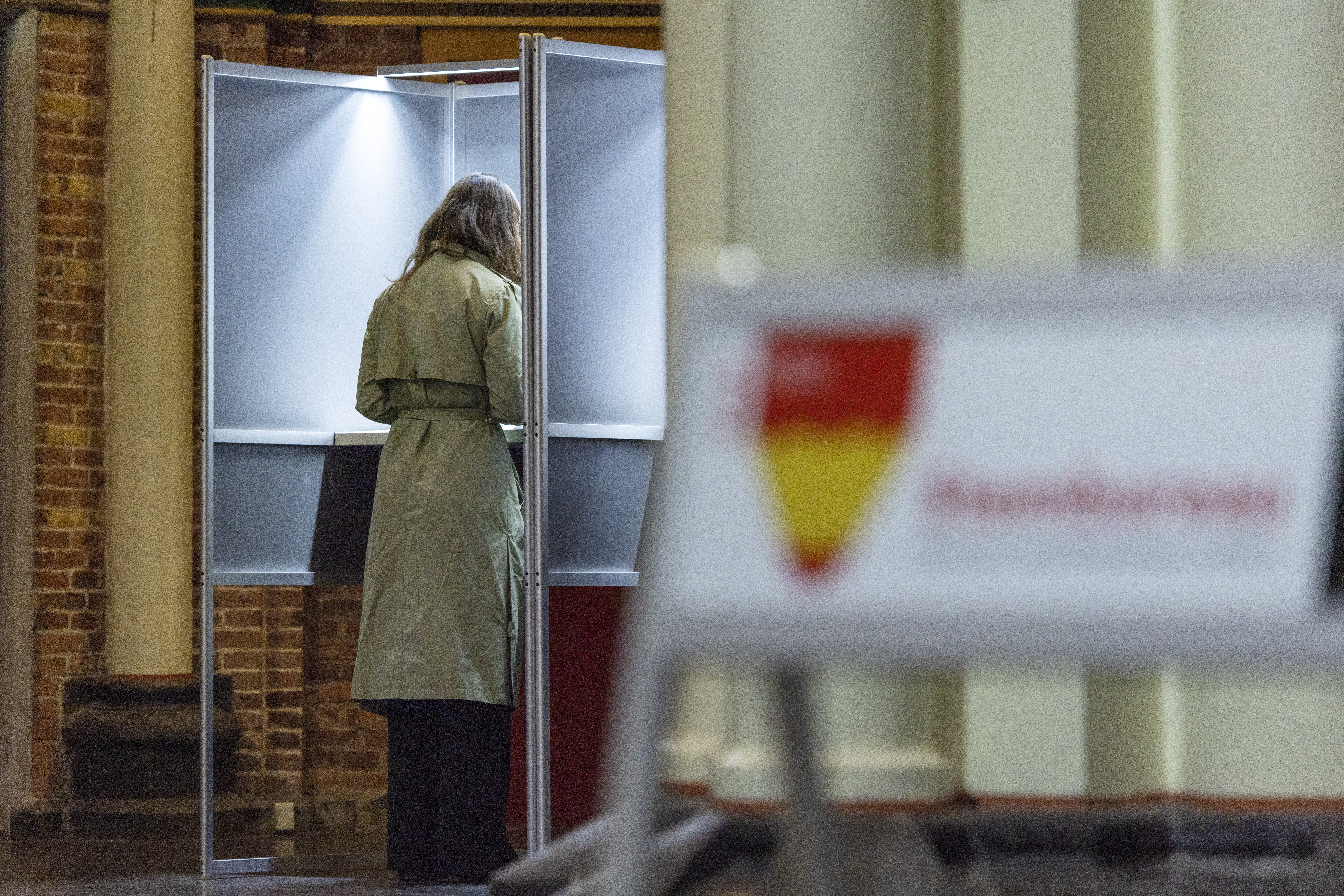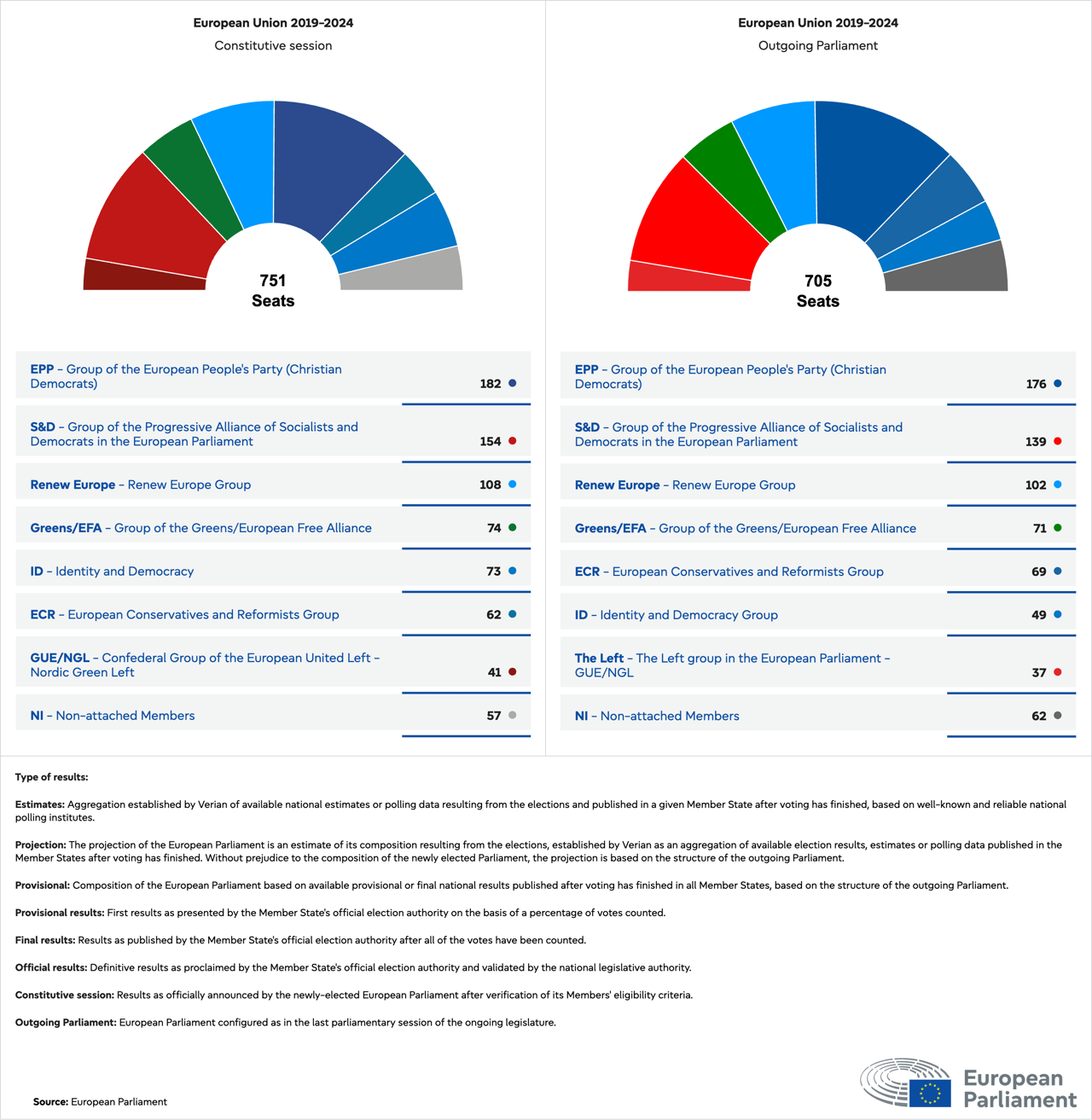More than 360 million Europeans were eligible to vote in this ongoing EU elections — a four-day democratic marathon across the 27 EU member states whose outcome will determine the influence of political forces in Europe over the next five years.
While European elections often see a low turnout (with the highest-recorded at just 51 percent in 2019), this time they have received increased focus, especially due to the major challenges the EU has faced since that last vote — mainly the Covid-19 pandemic and the war in Ukraine.)
Unlike previous EU elections, but mirroring national outcomes, the 2024 elections have the potential to shift the traditional power balance from progressive forces to those on the right — and either increase fragmentation of party groupings within the next European Parliament, or see some sort of consolidation of national conservatives plus populist far-right forces.
While we are still awaiting final results from EU member states (namely Italy, where the last voting polls close at 23:00), follow our live coverage below:
Latest from Pollwatch (16:01)
Dive into the latest insights from our collaborative Pollwatch project, offering updates on evolving political landscapes — alongside potential shifts in upcoming party dynamics.
Turnout figures (15:30)
As the first results come trickling in, turnout is shaping up to be high across Europe, possibly improving upon 2019. Apart from the high turnout in the Netherlands, the first results in Czechia and Latvia suggest an improvement over 2019, with preliminary data from France registering a slight uptick as well.
But in Hungary especially, turnout is shaping up to be impressive: at 1 pm 33 percent of voters showed, a whopping ten percent higher than in 2019.
It remains to be seen who stands to benefit from the stronger participation, however. Whereas results from the Netherlands indicate that pro-European voters had contributed to the higher turnout, it could also stem from more successful mobilisation by the far-right, whose voters historically show up less during European elections.
26 million new voters (12:34)
Many teenagers aged 16 will on Sunday have voted for the first time in Belgium and Germany, (which both lowered their voting age in the last couple of years), as well as Austria, and Malta, where it was already permitted. In Greece, they can do so from the age of 17. It is estimated that a million young voters, aged 16 and 17, will vote for the first time in 2024. As a result, it is estimated that there will be around 26 million eligible first-time voters for these European elections.
What happens after election night? (12:30)
EU member states’ authorities will communicate to the European Parliament the names of the elected MEPs in the coming days.
Meanwhile, political groups will rush to rearrange themselves — to split funds and the possible top jobs. By 15 July, political groups will notify the EU parliament president, Roberta Metsola, of their names, their political declaration and their composition. The new mandate of the European Parliament, in its joint homes of Brussels and Strasbourg, will officially start on 16 July.
Insights from the Netherlands, Ireland, Slovakia, the Czech Republic and Latvia (Sunday 12:15)
As we warm up for the election night, citizens in the Netherlands (6 June), Ireland (both on Friday 7 June), the Czech Republic (7-8 June), Slovakia (8 June) and Latvia (8 June) have already voted.
The exit polls in the Netherlands on Thursday night showed that high voter turnout in the Dutch elections was crucial in affecting the outcome, which was more favourable for the pro-EU camp than expected. Though Geert Wilders’ far-right Party for Freedom (PVV) is projected to win seven seats, the Green-socialist coalition party remained on top with eight seats.
Though Ireland conducted no exit polls, simultaneous local elections suggest the liberal Fianna Fáil and the centre-right Christian democrats of Fine Gael performed well, while Greens are projected to slump, winning none of Ireland’s 15 seats.
In Slovakia, where the vote took place in the aftermath of the assassination attempt on prime minister Robert Fico, polls stayed open for longer than planned, after a polling station temporarily closed over a white powder scare. According to unofficial results released on Sunday morning, the liberal Progressive Slovakia narrowly beat Fico’s Smer.
In the Czech Republic and Latvia, no exit polls were organised. We will have to wait for the first estimates and provisional results later today to know more.
But the opposition Czech ANO party, led by former prime minister Andrej Babis, is leading the polls with a populist stance critical of Brussels. The ruling coalition of prime minister Petr Fiala, known as Together, was polling closely behind the ANO party. The Pirate Party and STAN, part of Fiala’s government, are also expected to win seats in the European Parliament.
According to Latvian media, and based on unofficial estimates, the National Alliance (from the European Conservatives and Reformists) and New Unity (European People’s Party) are projected to get two seats each. Meanwhile, For Latvia’s Development (Renew), the United List (European Conservatives and Reformists), Latvia In First Place (a relatively new right-wing populist party without a specific European affiliation), Harmony (Socialists and Democrats) and the Progressives (Greens) are expected to gain one seat each.

The outgoing European Parliament (11:30)
The last European Parliament originally had 751 seats as the UK was still a member. After Brexit, this number was reduced to 705. 23 out of the 73 seats previously held by UK MEPs were reallocated to EU member states while the remaining 46 seats were kept in reserve for potential future EU enlargements. France, Spain, and the Netherlands each gained two additional seats. Austria, Belgium, Poland, Slovenia, Slovakia, Finland, Latvia, Ireland, and Denmark each gained one additional seat. As a result, the number of MEPs elected in 2024 will be 720.


